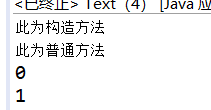1.构造函数(Constructor)定义格式:
访问控制符(public等)+方法名(必须和类名一致)+参数(可有可无)
2.功能:主要再构建对象时对对象进行初始化,必须与new运算符一起使用。
3.区别:
(1)构造函数没有返回值,也不能用void来修饰。普通方法必须有返回值。
(2)在命名规则上,构造函数一般是首字母大写,普通函数遵照小驼峰式命名法。
(3)构造函数不能被直接调用,必须通过new运算符在创建对象时才会自动调用;而一般的方法是在程序执行到它的时候被调用的;
(4)构造函数在new的时候自动调用优先级高于普通方法
blic class Math {
private int count;
//构造函数
/**修饰符 函数名(形式参数){
* 函数体
* }
*/
public Math() {
System.out.println("此为构造方法");
}
//普遍方法
public void math() {
System.out.println("此为普通方法");
}
public int add() {
count++;
return count;
}
public int getCount() {
return count;
}
public void setCount(int count){
this.count = count;
}
}
//测试函数
public class Text {
public static void main(String[] args) {
//初始化a
Math a = new Math();
//调用普通方法
a.math();
int count = a.getCount();
System.out.println(count);
a.add();
int count1 = a.getCount();
System.out.println(count1);
}
}
测试结果:

